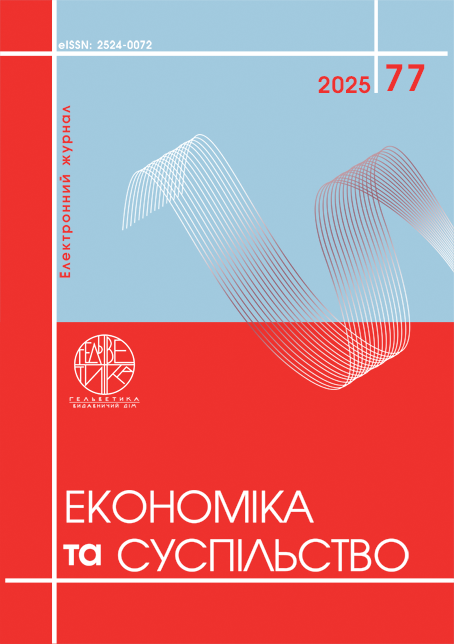PROJECT IMPLEMENTATION APPROACH: EVOLUTION AND APPLICATION
Abstract
The article provides a structured analysis of project implementation models with emphasis on their applicability in contemporary organizational settings. The relevance derives from increasing environmental volatility, shortened technology cycles, and the methodological challenge of reconciling formal rigor with adaptive flexibility. The objective is to systematize classical, iterative, incremental, and hybrid approaches, evaluate their advantages and limitations, and formulate practical applicability criteria. The methodological basis includes comparative analysis of authoritative sources, synthesis of international standards (PMBOK Guide, PRINCE2), and examination of case material from information technology, construction, energy, and consulting. The Waterfall model is shown to remain valid for stable contexts characterized by high cost of late change, where sequential structuring and documentation mitigate delivery risks. Rolling Wave planning is positioned as a technique of progressive elaboration, facilitating early project initiation and effective staged program realization. Iterative models enable controlled revisiting of requirements and design in response to empirical feedback, improving risk detection but increasing demands on organizational maturity. Incremental development, particularly in Scrum-based implementation, emphasizes delivery of functional product increments, reinforcing stakeholder involvement and value realization, while complicating cost prediction. Hybrid approaches integrate governance mechanisms of traditional frameworks with adaptive execution practices, combining stage boundaries and baselines with iterative delivery, Kanban visualization, and continuous review. The results establish correspondence between models and contextual domains: Waterfall with product–process configurations and civil works; Rolling Wave with staged programs; iterative and incremental with complex projects; and hybrid models with portfolios under mixed uncertainty. The conclusions underline that no universal life cycle model exists and that deliberate hybridization represents the most sustainable trajectory for organizations operating under conditions of uncertainty.
References
Ройс В. Управління розробленням великих програмних проєктів. Proceedings of IEEE WESCON. 1970. С. 1–9.
Ларман К., Басілі В. Ітеративна та інкрементна розробка: коротка історія. IEEE Computer. 2003. Т. 36, № 6. С. 47–56.
Белл Т., Тейєр Т. Вимоги до програмного забезпечення: чи справді це проблема? IEEE Computer. 1976. Т. 9, № 10. С. 61–68.
U.S. Department of Defense. Defense Systems Software Development Standard. Washington, 1985. 54 p.
Project Management Institute. A Guide to the Project Management Body of Knowledge (PMBOK Guide). 7th ed. Newtown Square: PMI, 2021. 370 p.
Office of Government Commerce. Managing Successful Projects with PRINCE2. London: TSO, 2009. 327 p.
Schwaber K., Sutherland J. The Scrum Guide. 2020. 22 p.
Snowden D., Boone M. A Leader’s Framework for Decision Making. Harvard Business Review. 2007. Vol. 85, № 11. P. 68–76.
Кон М. Оцінювання і планування в Agile. Харків: Фабула, 2019. 640 с.
Піхлер Р. Agile продукт-менеджмент за допомогою Scrum. Створення продуктів, що подобаються клієнтам. Харків: Фабула, 2020. 640 с.
Сазерленд Д. Scrum. Навчись робити вдвічі більше за менший час. Харків: Клуб сімейного дозвілля, 2016. 280 с.
Kerzner H. Project Management: A Systems Approach to Planning, Scheduling and Controlling. 12th ed. Hoboken: Wiley, 2022. 832 p.
Kloppenborg T. Contemporary Project Management: Organize, Plan, Perform. 3rd ed. Mason: South-Western Cengage Learning, 2015. 544 p.
Larson E., Gray C. Project Management: The Managerial Process. 8th ed. New York: McGraw-Hill Education, 2021. 720 p.
Martinelli R., Milosevic D. Project Management ToolBox. 2nd ed. Hoboken: Wiley, 2016. 544 p.
Pinto J. Project Management: Achieving Competitive Advantage. 5th ed. Boston: Pearson, 2021. 720 p.
Turner R. Handbook of Project Management. 6th ed. London: Routledge, 2024. 460 p.
Royce, W. W. (1970). Managing the Development of Large Software Projects. Proceedings of IEEE WESCON, 1–9.
Larman, C., & Basili, V. (2003). Iterative and incremental development: A brief history. IEEE Computer, 36(6), 47–56.
Bell, T., & Thayer, T. (1976). Software requirements: Are they really a problem? IEEE Computer, 9(10), 61–68.
U.S. Department of Defense. (1985). Defense Systems Software Development Standard. Washington.
Project Management Institute. (2021). A Guide to the Project Management Body of Knowledge (PMBOK Guide) (7th ed.). Newtown Square, PA: PMI.
Office of Government Commerce. (2009). Managing Successful Projects with PRINCE2. London: TSO.
Schwaber, K., & Sutherland, J. (2020). The Scrum Guide.
Snowden, D., & Boone, M. (2007). A leader’s framework for decision making. Harvard Business Review, 85(11), 68–76.
Kon, M. (2019). Otsiniuvannia i planuvannia v Agile. Kharkiv: Fabula.
Pikhler, R. (2020). Agile produkt-menedzhment za dopomohoiu Scrum. Stvorennia produktiv, shcho podobaiutsia kliientam. Kharkiv: Fabula.
Sazerlend, D. (2016). Scrum. Navchys robyty vdvichi bilshe za menshyi chas. Kharkiv: Klub simeinoho dozvillia.
Kerzner, H. (2022). Project Management: A Systems Approach to Planning, Scheduling and Controlling (12th ed.). Hoboken: Wiley.
Kloppenborg, T. (2015). Contemporary Project Management: Organize, Plan, Perform (3rd ed.). Mason: South-Western Cengage Learning.
Larson, E., & Gray, C. (2021). Project Management: The Managerial Process (8th ed.). New York: McGraw-Hill Education.
Martinelli, R., & Milosevic, D. (2016). Project Management ToolBox (2nd ed.). Hoboken: Wiley.
Pinto, J. (2021). Project Management: Achieving Competitive Advantage (5th ed.). Boston: Pearson.
Turner, R. (2024). Handbook of Project Management (6th ed.). London: Routledge.
Copyright (c) 2025 Олексій Просніцький, Вікторія Ліщинська

This work is licensed under a Creative Commons Attribution 4.0 International License.


